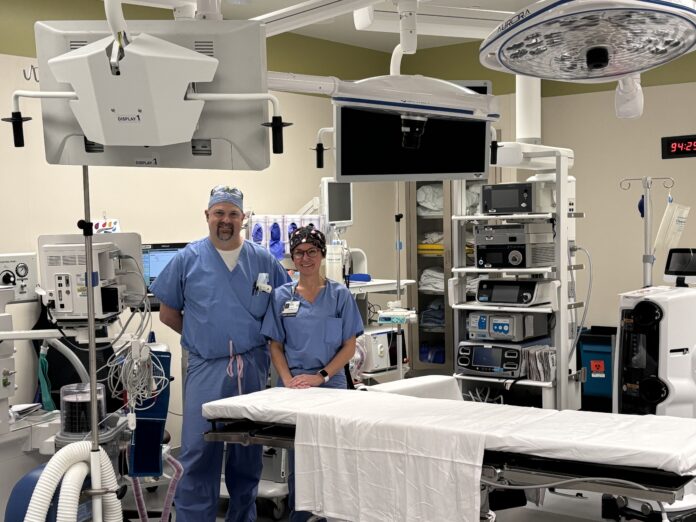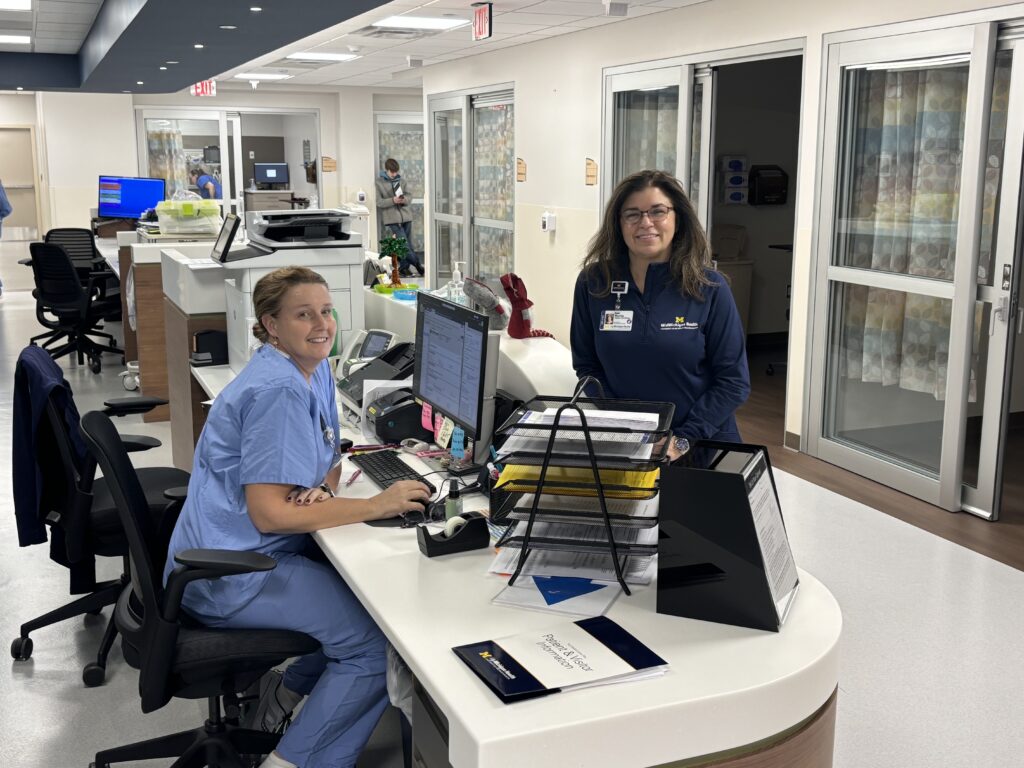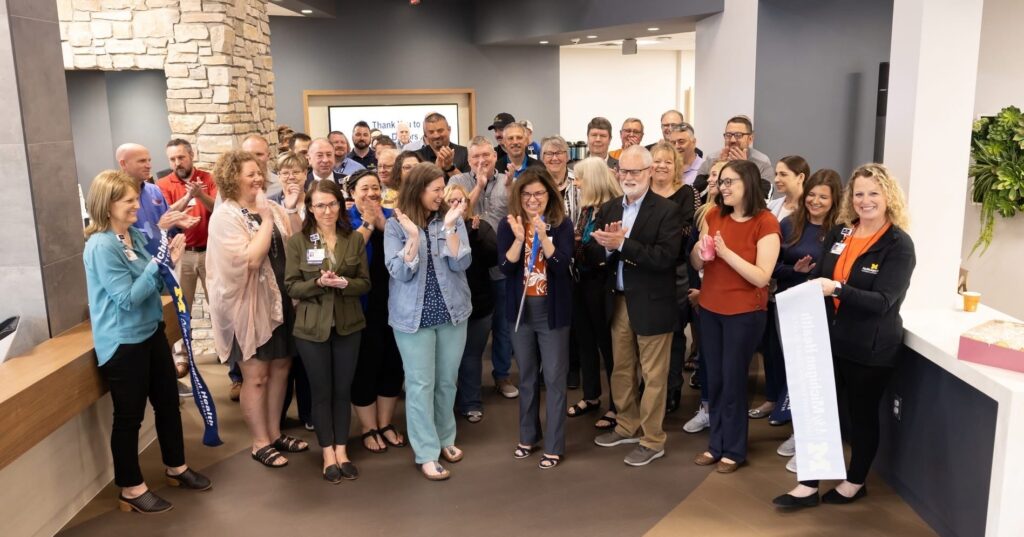


Michael MacDonald
Herald Editor
With a sweeping renovation and expansion of its Surgical Services wing, MyMichigan Medical Center Alma recently capped a multi-faceted, $26 million construction project aimed at enhancing patient care through cutting-edge technology and modernized facilities.
The Medical Center broke ground on the 51,200 square-feet revamp in the summer of 2022, and the final phase was completed earlier this month with the addition of 18 private pre-operative and recovery rooms, a seven-bed Post Anesthesia Care unit, and a day surgery area.
“We are excited to bring to a close this construction project, which combines the latest, state-of-the-art surgical technology, as well as increased comfort and privacy for patients and their families,” said Marita Hattem-Schiffman, president of MyMichigan Medical Centers in Alma, Clare and Mt. Pleasant. “The most advanced surgical services will continue to be available to all central Michigan communities through this significant investment”
The first phase of the initiative was completed last March when the hospital opened four new surgical suites built to improve performance and workflow during procedures.
These larger operating rooms feature ceiling-mounted booms for improved efficiency, ultra-efficient LED lights, and enhanced video monitors for clearer visualization of images, X-rays, and patient vital signs. Moreover, they are equipped to support remote collaboration, consulting and teaching.
Hattem-Schiffman told The Herald that the expanded suites provide the Medical Center with the capability to perform a full range of surgical procedures while preparing for future advancements in care. She highlighted that the renovations have made it possible to attract new surgeons as well.
“Over the past few years, we have recruited surgeons who offer new services, but without the renovation of our surgical departments, we never would have attracted them,” she said. “For example today’s surgeons are being trained on robotics. Our new operating rooms have the right size and infrastructure to support that.”
The expansion also includes a streamlined Sterile Processing department, now located closer to the operating rooms to improve efficiency. This area is responsible for decontaminating, assembling, sterilizing, and distributing surgical instruments and equipment, ensuring they are ready for use during procedures.
Back in May, the Medical Center completed phase two of the project, with a new main entrance for better access to outpatient services and testing, and for those who will be having surgery or a procedure.
“The new main entrance is a warm, inviting showcase that provides our patients and guests easier access to outpatient and surgical services, including closer parking and shorter walks,” Hattem-Schiffman said.
With the updated facilities, many patients no longer need to travel to larger cities for specialized care. Hattem-Schiffman noted that the Alma Medical Center serves residents from six counties and provides a wide range of specialized surgeries, including bariatric, trauma and orthopedic procedures.
“Our mantra is ‘care close to home,’” she said. “Patients shouldn’t have to travel to the ‘big city’ for excellent health care, and in central Michigan they don’t. For most of us, all the care we will need in a lifetime can be obtained right here, in a Medical Center with strong quality outcomes and an exceptional workplace culture.”
The impact of the project extends well beyond the surgical unit, strengthening the Medical Center’s position as a regional healthcare hub and a key driver of financial growth for the community.
As Gratiot County’s largest employer, the hospital plays an essential role in fostering economic development. Hattem-Schiffman highlighted the ripple effects of job creation and local investment.
“If we grow, not only does the community receive more and better health care services, but we are able to create more jobs, which translates into more people living here, consuming here, paying taxes, putting kids in schools, and so on,” she said.
The expansion has also boosted morale among staff at the Medical Center, as employees felt their feedback was valued during the design process. Hattem-Schiffman said the upgrades reflect a shared commitment to improving care for the community.
“Every team member is so proud of our renovated facility and the input they had in the design,” she said. “We all chose to work here because we care personally about this community and are invested in improving its health,”
The Medical Center president noted the updates are part of a series of improvements at the hospital, including new MRI and CT imaging systems, a Cardiac Cath lab, a Maternity Center, an expanded Behavioral Health unit, and a family medicine training program.
The surgical suites and pre- and post-operative areas were made possible in part by donations to the MyMichigan Health Foundation, which raised $1.2 million of the $26 million needed for the project.
The Foundation supports MyMichigan’s mission of enhancing patient care and community health through fundraising efforts. In addition to contributing to capital projects like the surgical expansion, it also funds scholarships for students pursuing health care careers and organizes community events to promote wellness.
One of the largest contributions to the foundation came from Garr Tool in Alma, which donated $250,000 to support the initiative.
“We are pleased to support this project that will impact so many people receiving care now and in the future,” said John Leppien, president of Garr Tool. “The residents of Gratiot County and the surrounding area benefit with access to quality care from MyMichigan Health. We appreciate being able to help broaden their vision by supporting this project that will offer world-class clinical care in a patient and family-friendly environment.”
Becky Church, director of the MyMichigan Health Foundation, highlighted the critical role donors have played in making the surgical services project a reality.
“Our donors’ invaluable financial contributions paved the way for this project. They are true partners in our purpose of ‘Creating Healthy Communities – Together,’” Church said. “Their gifts will help patients, families, our community and region for years to come. The commitment they show to the well-being of our community inspires us every day.”
Volunteers at MyMichigan Medical Center Alma also played a vital role in supporting the hospital’s recent expansion, contributing a portion of $52,394 raised through gift shop sales and special events during the 2023-2024 year.
“These individuals have made an enormous impact on the patients served here,” said Anna Parker-McDonald, manager of volunteer services. “Patient families and visitors stop in to see what’s available for their loved ones, and we also have regular employee shoppers and shoppers from the community who visit us. It is gratifying to put the dollars we earn back into helping.”
The funds supported equipment and other improvements for the project, with the remainder benefiting other areas of the hospital.
“Our volunteers have a long history of going above and beyond to ensure that our Medical Center has the support it needs,” said Church. “When we started the Alma Surgical Services fundraising campaign, we knew the volunteers would play a significant role in supporting its progress, and they went above and beyond to ensure we had the support we needed.”
The Medical Center’s impact during fiscal year 2024 illustrates the scope of care it provides to the region. In that span, the hospital performed 4,848 surgical procedures, cared for 5,639 patients in its four-story inpatient tower, and provided emergency care for 15,089. It also delivered 443 babies and administered 4,407 cancer treatments.
Diagnostic imaging services, including CT, MRI, and mammography, exceeded 50,000, while over 154,000 lab tests were conducted. Furthermore, approximately 17,000 services per month were offered to patients entering through the new main entrance.
Reflecting on the breadth of the two-year project, Hattem-Schiffman emphasized how the upgrades position the Medical Center to address current needs while staying prepared for emerging innovations in health care. She said the improvements ensure the hospital remains at the forefront of technology, ready to adapt as the industry evolves.
“By modernizing, we better meet today’s needs with the latest technology and ensure that we can evolve with future advancements,” she said. “Maintaining state-of-the-art facilities is essential to staying competitive and meeting the evolving needs of our region.”
